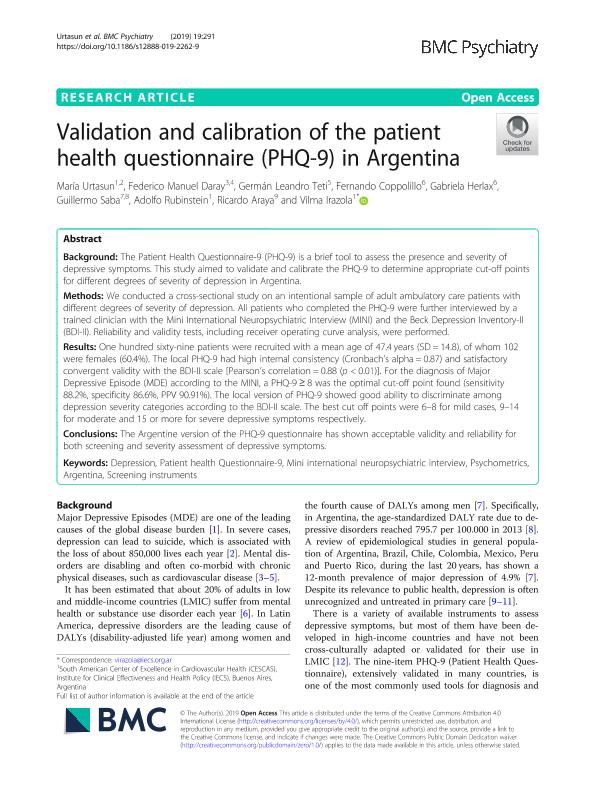Mostrar el registro sencillo del ítem
dc.contributor.author
Urtasun, María
dc.contributor.author
Daray, Federico Manuel

dc.contributor.author
Teti, Germán Leandro

dc.contributor.author
Coppolillo, Fernando Enrique

dc.contributor.author
Herlax, Gabriela
dc.contributor.author
Saba, Guillermo
dc.contributor.author
Rubinstein, Adolfo Luis

dc.contributor.author
Araya, Ricardo
dc.contributor.author
Irazola, Vilma

dc.date.available
2021-11-26T15:44:01Z
dc.date.issued
2019-09
dc.identifier.citation
Urtasun, María; Daray, Federico Manuel; Teti, Germán Leandro; Coppolillo, Fernando Enrique; Herlax, Gabriela; et al.; Validation and calibration of the patient health questionnaire (PHQ-9) in Argentina; BioMed Central; Bmc Psychiatry; 19; 1; 9-2019; 1-10
dc.identifier.issn
1471-244X
dc.identifier.uri
http://hdl.handle.net/11336/147518
dc.description.abstract
Background: The Patient Health Questionnaire-9 (PHQ-9) is a brief tool to assess the presence and severity of depressive symptoms. This study aimed to validate and calibrate the PHQ-9 to determine appropriate cut-off points for different degrees of severity of depression in Argentina. Methods: We conducted a cross-sectional study on an intentional sample of adult ambulatory care patients with different degrees of severity of depression. All patients who completed the PHQ-9 were further interviewed by a trained clinician with the Mini International Neuropsychiatric Interview (MINI) and the Beck Depression Inventory-II (BDI-II). Reliability and validity tests, including receiver operating curve analysis, were performed. Results: One hundred sixty-nine patients were recruited with a mean age of 47.4 years (SD = 14.8), of whom 102 were females (60.4%). The local PHQ-9 had high internal consistency (Cronbach's alpha = 0.87) and satisfactory convergent validity with the BDI-II scale [Pearson's correlation = 0.88 (p < 0.01)]. For the diagnosis of Major Depressive Episode (MDE) according to the MINI, a PHQ-9 ≥ 8 was the optimal cut-off point found (sensitivity 88.2%, specificity 86.6%, PPV 90.91%). The local version of PHQ-9 showed good ability to discriminate among depression severity categories according to the BDI-II scale. The best cut off points were 6-8 for mild cases, 9-14 for moderate and 15 or more for severe depressive symptoms respectively. Conclusions: The Argentine version of the PHQ-9 questionnaire has shown acceptable validity and reliability for both screening and severity assessment of depressive symptoms.
dc.format
application/pdf
dc.language.iso
eng
dc.publisher
BioMed Central

dc.rights
info:eu-repo/semantics/openAccess
dc.rights.uri
https://creativecommons.org/licenses/by-nc-sa/2.5/ar/
dc.subject
ARGENTINA
dc.subject
DEPRESSION
dc.subject
MINI INTERNATIONAL NEUROPSYCHIATRIC INTERVIEW
dc.subject
PATIENT HEALTH QUESTIONNAIRE-9
dc.subject
PSYCHOMETRICS
dc.subject
SCREENING INSTRUMENTS
dc.subject.classification
Epidemiología

dc.subject.classification
Ciencias de la Salud

dc.subject.classification
CIENCIAS MÉDICAS Y DE LA SALUD

dc.title
Validation and calibration of the patient health questionnaire (PHQ-9) in Argentina
dc.type
info:eu-repo/semantics/article
dc.type
info:ar-repo/semantics/artículo
dc.type
info:eu-repo/semantics/publishedVersion
dc.date.updated
2021-01-04T14:32:21Z
dc.journal.volume
19
dc.journal.number
1
dc.journal.pagination
1-10
dc.journal.pais
Reino Unido

dc.journal.ciudad
Londres
dc.description.fil
Fil: Urtasun, María. Instituto de Efectividad Clínica y Sanitaria; Argentina. Universidad de Alcalá; España
dc.description.fil
Fil: Daray, Federico Manuel. Consejo Nacional de Investigaciones Científicas y Técnicas; Argentina. Universidad de Buenos Aires; Argentina
dc.description.fil
Fil: Teti, Germán Leandro. Gobierno de la Ciudad Autónoma de Buenos Aires. Hospital Neuropsiquiátrico Braulio Aurelio Moyano; Argentina
dc.description.fil
Fil: Coppolillo, Fernando Enrique. Universidad de Buenos Aires. Facultad de Medicina; Argentina
dc.description.fil
Fil: Herlax, Gabriela. Universidad de Buenos Aires. Facultad de Medicina; Argentina
dc.description.fil
Fil: Saba, Guillermo. Instituto de Efectividad Clínica y Sanitaria; Argentina
dc.description.fil
Fil: Rubinstein, Adolfo Luis. Consejo Nacional de Investigaciones Científicas y Técnicas. Oficina de Coordinación Administrativa Parque Centenario. Centro de Investigaciones en Epidemiología y Salud Pública. Instituto de Efectividad Clínica y Sanitaria. Centro de Investigaciones en Epidemiología y Salud Pública; Argentina
dc.description.fil
Fil: Araya, Ricardo. London School of Hygiene and Tropical Medicine; Reino Unido
dc.description.fil
Fil: Irazola, Vilma. Instituto de Efectividad Clínica y Sanitaria; Argentina. Consejo Nacional de Investigaciones Científicas y Técnicas; Argentina
dc.journal.title
Bmc Psychiatry

dc.relation.alternativeid
info:eu-repo/semantics/altIdentifier/url/https://bmcpsychiatry.biomedcentral.com/articles/10.1186/s12888-019-2262-9
dc.relation.alternativeid
info:eu-repo/semantics/altIdentifier/doi/http://dx.doi.org/10.1186/s12888-019-2262-9
Archivos asociados
